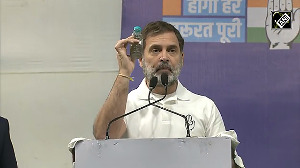All We Imagine as Light has been on several critics' best of the year lists, including Sight and Sound (Payal Kapadia appeared on the magazine's cover, perhaps a first for an Indian filmmaker), to The New York Times, Time and it is the number one film recommended by Barack Obama.
The future certainly belongs to Payal Kapadia, asserts Aseem Chhabra.

In the summer of 2021, the Cannes Film Festival programmed Payal Kapadia's first feature, a free flowing, experimental documentary about student protests across universities in India. Like her previous short films What is the Summer Saying? and Afternoon Clouds, the documentary had a poetic title, A Night of Knowing Nothing.
But the pandemic was a reality then.
India was in the red zone and restrictions were imposed on Indian journalists' travel to France.
I watched Kapadia's film online and was perhaps the only Indian journalist to interview her, that too via e-mail. There was limited access to Kapadia, possibly because of the political nature of the documentary.
A Night of Knowing Nothing won the Golden Eye award for the top documentary film in Cannes that year.
But in India this event hardly made news. ANOKN was later shown at some film festivals and special screenings in India but Kapadia was missing from the scene. She essentially dropped out from the public eye, even deleting her Facebook account.

But what a difference three years can make!
Today Payal Kapadia's name is known to everyone who follows meaningful cinema in India, at least the indies and the film festivals scene. There will always be a big flock of mainstream filmgoers who will only care to see the latest Allu Arjun film which took control over nearly all the theatres across India.
But in its own small way, Payal Kapadia's second feature All We Imagine as Light -- the title inspired from a painting by her mother, the well-known painter Nalini Malani -- has been running in theatres in India for over a month.
After the festival outings in Mumbai, Dharamsala and a few other cities, many more filmgoers have been able to watch Kapadia's lyrical account of sisterhood, love and compassion in the large metropolis called Mumbai.

That is why I believe the year 2024 belongs to Payal Kapadia. A new star is born and she will surely rule the Indian film scene for many years to come.
This year, Kapadia's journey began when she premiered AWIAL at Cannes in May.
After the screening everyone was sure the film would win something big at the festival, and AWIAL won the Grand Prix, only the second time for an Indian film in the history of the Cannes Film Festival.
Suddenly, the film was on a roll, from screenings at the top three fall festivals in North America, Telluride, Toronto and New York, to awards at other film events, and finally the film's release in the US and Europe.
Kapadia made herself available to as many festivals she could attend, doing post screening Q&As, mingling with the audience and looking happy.
Eight months later, she is still traveling around the world, dropping in for a couple of days at the Marrakech International Film Festival, then back in New York for the post screening Q&A with Shuchi Talati, the director of the other standout Indian film of 2024, Girls Will Be Girls and then receiving an honorary award at the International Film Festival of Kerala.
The second part of the journey happened with the film's brief release in Kerala to qualify for the Oscars.
Unfortunately, the Film Federation of India decided not to send AWIAL as India's official entry for the Best International Feature Film Oscar race.

Kapadia did not display any bitterness about the fact that India did not select her film, even as it has now become increasingly evident that it would almost certainly have been one of the five nominated films. I am sure she was disappointed but she moved on, shifting her focus to the film's release across India.
By now she was back on social media.
She used the access to her followers to highlight the film's release schedules.
Then, when she received reports that some theatres were not projecting the film in the correct aspect ratio, she became a one-woman force, almost an activist, calling upon the viewers to demand that theatres stop the film and then re-screen it as it was meant to be seen.
In all the years I have been covering films, I have rarely seen a film-maker pour in all her energy into ensuring that her film would be seen and appreciated in the way it should be. But Kapadia has been on a mission since the November 22 release of AWIAL.
Even until this week, she has been posting tweets informing her followers of new showtimes in Delhi, Pune, Chandigarh, Kanpur, Kolkata and Guwahati and asking others to fill out forms requesting for shows to be added in their cities.

Kapadia is charming, always smiling, laughing, thrilled to be amidst fans, followers, talking to journalists, bloggers, influencers and festival programmers about her film and her passion for cinema. I often get to see short reels on Instagram with Kapadia talking to bloggers and journalists.
There are perhaps only a handful of Indian filmmakers who would willingly interact with the media for such a long while before and after the release of their film.
But she does not want to stop connecting with the potential audience of her film, even if it takes her one Sunday morning to walk through the streets of Mumbai where her film was shot. She loves it. That is pretty evident.
Kapadia's conversations often head in the direction of the filmmakers she admires and those who influenced her, from Ritwik Ghatak to Pa Ranjith, Rima Das, Miguel Gomes, Aki Kaurismäki, Agnes Varda and Milos Forman.
Clearly, her education at FTII made her the filmmaker and thoughtful person that she is.
Her tenure at FTII was marred with challenges and issues with the authorities but right now, she is the poster child of government sponsored, non-judgmental educational institutions that encourage free thinking and the ability to question among artists and intellectuals.
I have lost count of how many critics' awards AWIAL has won in the US.
The film has also been on the several critics' best of the year lists, including Sight and Sound (Kapadia appeared on the cover of the magazine, perhaps a first for an Indian filmmaker), to The New York Times, Time and it is the number one film recommended by Barack Obama.
Variety just named Kapadia one of the international breakouts of 2024, along with Coralie Fargeat, director of The Substance, and Richard Gadd and Jessica Gunning, the stars of Netflix's Baby Reindeer. She has also received two Golden Globe nominations, including one in the best director category.
That's why Kapadia is already the real winner. The year belongs to her. The future belongs to her.
In May, after All We Imagine as Light won the Grand Prix, Kapadia brought her three lead women actors, Kani Kusruti, Divya Prabha and Chhaya Kadam, on the stage. The four women hugged and then Kapadia began to speak, when an usher showed her the side she should exit from.
'I am not done yet,' Kapadia said with a smile, as the audience laughed.
Yes, Kapadia is not done yet.












 © 2025
© 2025